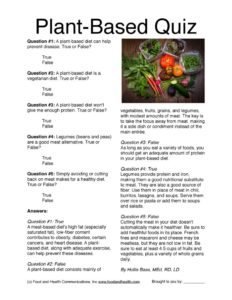Plant-Based Eating Pattern Quiz
I'm back with a fantastic quiz from Hollis Bass, MEd, RD, LD. Test your knowledge and share this engaging resource with your clients -- there's even a printable handout at the bottom of the post...1. A plant-based diet can help prevent disease. True or False?Answer: True. A meat-based diet's high fat (especially saturated fat), low-fiber content contributes to obesity, diabetes, certain cancers, and heart disease. A plant-based diet, along with adequate exercise, can help prevent these diseases.2. A plant-based diet is a vegetarian diet. True or False?Answer: False. A plant-based diet consists mainly of vegetables, fruits, grains, and legumes, with modest amounts of meat. The key is to take the focus away from meat, making it a side dish or condiment instead of the main entrée.3. A plant-based diet won't give me enough protein. True or False?Answer: False. As long as you eat a variety of foods, you should get an adequate amount of protein in your plant-based diet.4. Legumes (beans and peas) are a good meat alternative. True or False?Answer: True. Legumes provide protein and iron, making them a good nutritional substitute to meat. They are also a good source of fiber. Use them in place of meat in chili, burritos, lasagna, and soups. Serve them over rice or pasta or add to soups and salads.5. Simply avoiding or cutting back on meat makes for a healthy diet. True or False?Answer: False. Cutting the meat in your diet doesn't automatically make it healthier. Be sure to add healthful foods in its place. French fries and macaroni and cheese may be meatless, but they are not low in fat. Be sure to eat at least 4.5 cups of fruits and vegetables, plus a variety of whole grains daily.6. I'll have to shop in expensive stores to follow a plant-based diet. True or False?Answer: False. Compare the cost per serving of beans, rice and pasta with meat and you can see how inexpensive a plant-based diet can be. These items, plus fruits and vegetables, are available at regular supermarkets.Tips for Getting Started
- Try chicken, turkey, and fish in place of red meat; they are lower in saturated fat.
- When you do use meat, mix it in casseroles and stir-fries, with lots of vegetables and pasta or rice. Think of meat as a condiment.
- If you have a family of meat-eaters, try one or two plant-based meals per week until they get used to new flavors and foods.
- Introduce beans as a side dish, gradually moving toward bean-based entrees.
- For recipes, visit www.foodandhealth.com/recipes.php.
By Hollis Bass, MEd, RD, LDMembers get more! Don't miss the members-only post Eat More Plants: Preparing Vegetable Flowers for exclusive videos available only to members. And here are a few additional resources for building a plant-based diet...[shopify embed_type="product" shop="nutrition-education-store.myshopify.com" product_handle="dvd-building-a-plant-based-eating-pattern-vegetables" show="all"][shopify embed_type="product" shop="nutrition-education-store.myshopify.com" product_handle="plant-power-poster-for-fruit-and-vegetable-promotion" show="all"][shopify embed_type="product" shop="nutrition-education-store.myshopify.com" product_handle="fruit-and-vegetable-challenge-tool-kit-with-powerpoint-shows" show="all"]Finally, here is a brand-new printable handout with the highlights of this quiz! Enjoy...


